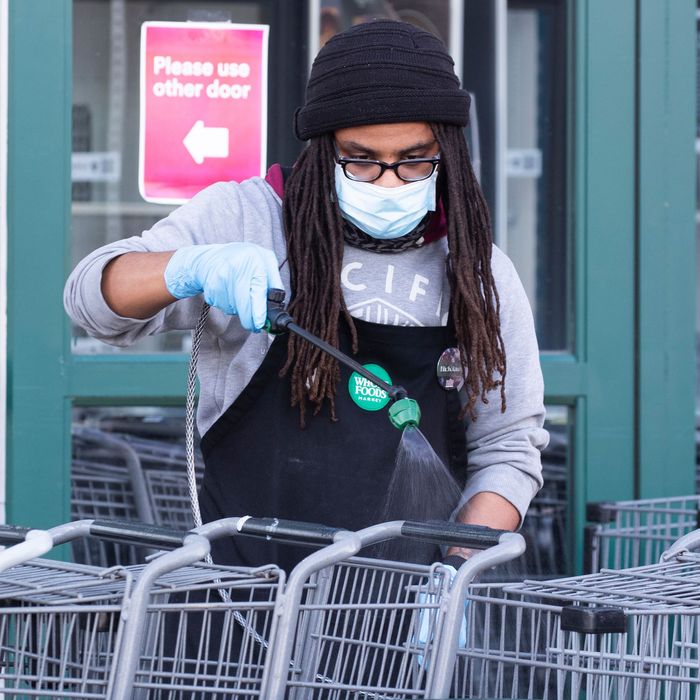
Governors and mayors around the country are lifting lockdown measures and urging residents to pick normal life up from where they’d dropped it. But the coronavirus is not a historical artifact. Cases are spiking, people are dying, and frontline workers are still in danger from getting sick on the job. 238 members of the United Food and Commercial Workers union have now died of the virus, president Marc Perrone said on a Thursday press call. Nearly 29,000 have been exposed to the coronavirus, or are currently ill. That figure includes workers in the retail, meatpacking, health-care, and food-processing industries who make up UFCW’s 1.3 million members.
“The human cost of the pandemic can’t be ignored, and it shouldn’t be hidden,” Perrone added.
But some powerful interests may prefer ignorance. The coronavirus, like any public-health crisis, was political from its genesis. But now it’s partisan, too. President Trump has hit the rally circuit, where going maskless amounts to a sign of devotion. The economy is improving, Trump insists; cases are going down, everything is great. Even some Democrats, like Mayor Bill de Blasio of New York City, are forging ahead with reopenings, despite the threat of viral resurgence. Essential workers, meanwhile, are caught between a paycheck and illness or death.
To protect these workers, employers and public officials alike would have to admit their reopening strategies may be premature and that masks are necessary, even if they’re slightly uncomfortable to wear. But despite rising cases in Texas, Arizona, and Florida, politics and pecuniary concerns are blocking basic safety measures. According to UFCW, many retail employers still aren’t requiring customers to wear masks. In the meatpacking industry, employer negligence continues to be particularly dangerous: Companies have abandoned workers — and nearby residents — to risk their chances with the virus.
A ProPublica investigation recently found that at plants owned by Tyson Foods, “best practices to protect workers, such as slowing the processing line to accommodate social distancing, installing plexiglass barriers and having workers wear masks, weren’t implemented until outbreaks began to occur.” In the days leading up to an outbreak at a Smithfield Foods pork plant in South Dakota, the company’s CEO told Nebraska governor Pete Ricketts that “social distancing is a nicety that makes sense only for people with laptops.” By late April, there were 783 COVID cases at the South Dakota plant. Two workers at the plant later died. The union estimates that nationwide, 65 meatpacking workers have died from the virus. 38 workers died in May alone, at a rate of over one death per day.
Grocery-store workers also continue to face enormous risks. 82 have now died from the coronavirus, with another 11,507 workers sick or exposed to the virus. “It’s scary and chaotic not knowing what you’re going to walk into every day you go to work, and when you hear that cases are rising, it only makes this fear even worse,” Candice Oglesby, a UFCW member who works for a Kroger in Texas, told reporters on Thursday. “What makes this so real is that even after months of this health threat, there is no enforcement of masks or social distancing for customers.”
UFCW has urged employers to establish and then enforce clear safety standards at work since the pandemic began. But there’s no pressure from above on negligent employers, which means corporations have the leeway they need to cut corners at work. As the editorial board of the New York Times recently noted, OSHA, the federal agency responsible for investigating workplace-safety violations, never issued enforceable guidelines to protect workers during the pandemic. When workers do report violations, the agency is often silent. “Workers at a Nebraska JBS beef processing plant alleged in April that they and their colleagues remained in close quarters during lunchtime and in the locker room despite ‘a number of positive cases of Covid-19,’” the Times wrote. But OSHA never investigated. 300 people eventually fell ill.
That leaves workers and unions like UFCW in a bind. The union’s #ShopSmart campaign, which launched in April, urged customers themselves to wear masks and practice social distancing, even if retailers and elected officials didn’t force them to do so. Perrone told Intelligencer on Thursday that the campaign “has been somewhat helpful.” But he remained critical of the government’s response, which he described as “inconsistent.”
“I do think it’s incumbent on us — and I’m talking about the UFCW, because we’ve got our members on the front line — to do everything we can to help,” he added. “Am I absolutely sure that the general public is going to listen to me? No, I’m not. But don’t I have a responsibility on behalf of my members to try anyway?”
The union is still calling for hazard pay, plus mandatory mask use in retail locations, and better safety standards at workplaces in general. It’s also asking for the creation of a national public registry, where employers with at least 1,000 workers on staff would have to submit monthly reports on coronavirus infections and deaths. But unless local or federal government steps in to force the matter, companies themselves don’t appear likely to listen. From a large employer’s vantage point, the world is all carrot and no stick. As one crop of workers dies off, or quits out of fear, another, even more desperate labor pool awaits exploitation.
Trump might be ready to move on. So might his voters, along with consumers and some local officials, too. But the virus is still here. Workers are still dying. And they are not disposable. We’re just treating them that way.
"still" - Google News
June 26, 2020 at 06:00PM
https://ift.tt/2ZeKy7F
Essential Workers Are Still Dying From Coronavirus - New York Magazine
"still" - Google News
https://ift.tt/35pEmfO
https://ift.tt/2YsogAP
Bagikan Berita Ini














0 Response to "Essential Workers Are Still Dying From Coronavirus - New York Magazine"
Post a Comment